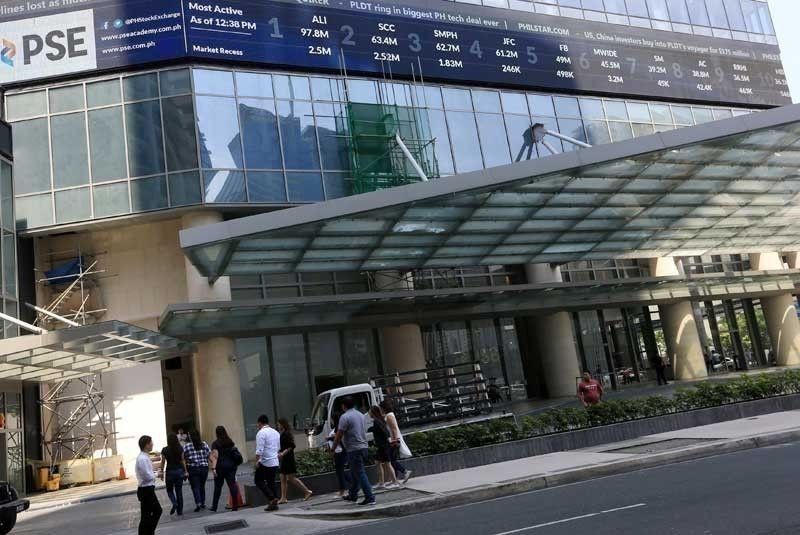Local shares retreat on Friday over 'Nu' COVID-19 variant concerns

MANILA, Philippines – Local shares fell on Friday as investors fear a new virus variant will dampen economic recovery.
The Philippine Stock Exchange index dropped 1.08% to finish weekly trading at 7,289.8.
The broader All-Shares index shed 33.12 points as all sub-indices figured in the red. Shares in the property index declined 1.73%.
For Luis Limlingan, head of sales at local brokerage Regina Capital, the slump on Friday reflected investors’ fears over the ‘nu’ variant, first detected in South Africa.
“Shares in the Philippines and across the region fell as renewed fears of the new covid variant which will be called 'nu' if it's deemed a 'variant of concern' by the WHO special meeting,” Limlingan said in a Viber message.
Regional markets did not fare so well either. Shares in Tokyo dived three percent while Hong Kong was more than 2% off — with Sydney, Seoul, Singapore, Taipei, Mumbai, Wellington and Jakarta more than 1% lower.
Hong Kong authorities reported that the B.1.1.529 variant popped up in the city as well.
Nevertheless, the PSE announced earlier this week that trading hours would revert to its usual 9am-3pm starting December 6.
Rastine Mercado, research head at Chinabank Securities, said the local bourse would be sensitive to this pandemic developments since the previous Delta variant surge sent infections to a record-high of 26,000 around the Philippines.
“We expect the market to remain sensitive to developments regarding this over the near-term even as the domestic pandemic situation continues to improve,” he said in a text message.
At home, foreign investors sold P545.03 million more shares than they bought in the stock market. A total of 1.04 billion local shares, valued at P9.97 billion, switched hands on Friday. — with AFP
Companies are facing massive challenges as they continue to navigate the impacts of the COVID-19 pandemic. Follow this page for regular updates. Main image by The STAR/Miguel de Guzman
Official data show China's economy grew much better than expected in the first three months of the year as the country reopened after the end of zero-COVID measures.
The figures were the first snapshot since 2019 of the world's second-largest economy unencumbered by the strict health controls that helped keep the coronavirus in check but battered businesses and supply chains.
After years of travel restrictions and quarantines, Chinese people in recent months have finally returned to restaurants and started to move around more freely, giving much-needed stimulus to services.
According to data published by the National Bureau of Statistics (NBS), the official growth figure for January to March was 4.5% — significantly higher than the 3.8% predicted by analysts in an AFP poll. — AFP
China's economy grew 4.5 percent year-on-year in the first quarter, official data showed Tuesday, after Beijing scrapped its zero-Covid measures late last year.
The country's March retail figures, the main indicator of household consumption, were up 10.6 percent on-year, the biggest bounce since June 2021.
According to figures published by the National Bureau of Statistics (NBS), industrial production in March climbed 3.9 percent year-on-year.
Tuesday's figures are the first snapshot since 2019 of a Chinese economy unencumbered by public health restrictions. — AFP
China is expected to announce an economic rebound on Tuesday, when Beijing releases its first quarterly GDP figures since abolishing growth-sapping Covid restrictions late last year.
The Asian giant's virus containment policy -- an unstinting regime of strict quarantines, mass testing and travel curbs -- strongly constrained normal economic activity before it was abruptly ditched in December.
The disclosures on Tuesday will give the first snapshot since 2019 of a Chinese economy unencumbered by public health restrictions, with analysts polled by AFP expecting an average of 3.8 percent year-on-year growth in the period from January through March. — AFP
British engine maker Rolls-Royce logs a large 2022 loss on a huge accounting charge linked to foreign exchange contracts, but revenue and operating profit jumped on rising orders.
Rolls posted a net loss of almost £1.3 billion ($1.5 billion), after a profit after tax of £120 million the previous year, it said in a statement.
Turnover however soared by more than a fifth to £13.5 billion and operating profit leapt 63 percent to £837 million, driven by rising orders for civil aviation and defence divisions. — AFP
Hong Kong's finance chief has unveiled a HK$761 billion (US$97 billion) budget on Wednesday, plunging into the coffers to pay for the recession-hit city's post-Covid recovery.
Hoping to kickstart the finance centre's economy, Finance Secretary Paul Chan announced tax cuts and more consumer spending vouchers.
Hong Kong's leaders are keen to resuscitate its fortunes after posting recessions in three of the past four years -- a tumultuous period that saw the economy battered by protests, virus controls and Beijing's authoritarian crackdown.
While rival financial hubs reopened to the world long ago, Hong Kong only fully emerged from pandemic isolation earlier this month when it restored its border with mainland China, its main economic pipeline.
"Our economy is at the early recovery stage, and members of the public as well as a large number of enterprises are still weighed down by tremendous pressure and require support," Chan tells legislators while announcing his 2023/24 budget. — AFP
- Latest
- Trending




























